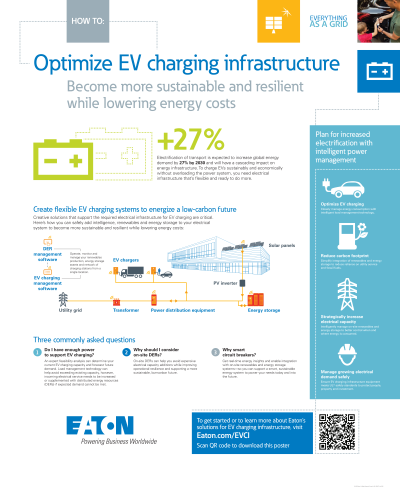Back

Grid Integration & Electrification
How to: Optimize EV charging infrastructure
A03 - How To Optimize EV Charging Infrastructure
Tuesday, September 20, 2022
4:30 PM – 5:30 PM
Location: ACC Arena Foyer/Hall A


Advait Katarki
Product Manager - Advanced Technology & Digitalization
Eaton
Peachtree City, Georgia, United States
Invited Poster Presenter(s)
Widespread adoption of electric vehicles (EV) will lead to a more sustainable future, but it can’t happen without a robust and accessible EV charging infrastructure (EVCI). Transportation electrification is expected to increase global electricity demand by 27 percent in the next decade. The ability to charge EVs efficiently and economically without overloading the power system is critical and depends on a reliable electrical infrastructure.
This poster will assess the impact EV growth will have on power demand, both on distribution systems and “behind the meter†in the commercial buildings that will need to offer EVCI, such as: workplaces, shopping centers, schools and colleges, and homes. The poster will also visually present various approaches to meeting power demands sustainably and explain how battery storage can make systems scalable.
Upon viewing the poster, electrical engineers, system designers and integrators, facility management teams, and project stakeholders will discover strategies to:
1. Improve energy efficiency
Couple battery energy storage with EV charging to shave peak demand costs and optimize the charging experience
2. Modernize operations
Future-proof the power distribution system for planned EV charging deployments
3. Increase reliability and resilience
Integrate DERs to reduce grid connection dependence and improve EV charging reliability and resiliency
4. Enhance safety
Ensure EV charging infrastructure equipment meets UL safety standards to protect people, property and investments
This poster will assess the impact EV growth will have on power demand, both on distribution systems and “behind the meter†in the commercial buildings that will need to offer EVCI, such as: workplaces, shopping centers, schools and colleges, and homes. The poster will also visually present various approaches to meeting power demands sustainably and explain how battery storage can make systems scalable.
Upon viewing the poster, electrical engineers, system designers and integrators, facility management teams, and project stakeholders will discover strategies to:
1. Improve energy efficiency
Couple battery energy storage with EV charging to shave peak demand costs and optimize the charging experience
2. Modernize operations
Future-proof the power distribution system for planned EV charging deployments
3. Increase reliability and resilience
Integrate DERs to reduce grid connection dependence and improve EV charging reliability and resiliency
4. Enhance safety
Ensure EV charging infrastructure equipment meets UL safety standards to protect people, property and investments
